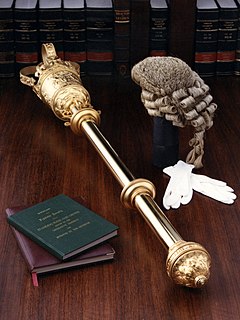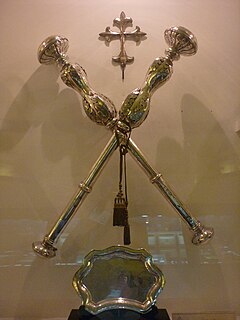 W
WA ceremonial mace is a highly ornamented staff of metal or wood, carried before a sovereign or other high officials in civic ceremonies by a mace-bearer, intended to represent the official's authority. The mace, as used today, derives from the original mace used as a weapon. Processions often feature maces, as on parliamentary or formal academic occasions.
 W
WA mace-bearer, or macebearer, is a person who carries a mace, either a real weapon or ceremonial.
 W
WThe mace of the House of Representatives of the Philippines, also called the mace of the House, is a ceremonial mace used by the House of Representatives of the Philippines.
 W
WThe mace of the Senate of the Philippines is a ceremonial mace used as the symbol of authority in the Senate of the Philippines.
 W
WThe Maces of the Rector Magnificus of the University of Santo Tomas (UST) are 17th-century silver maces which are considered to be the oldest symbols of the office Rector Magnificus of the University of Santo Tomas, the oldest extant European-chartered university in Asia.
 W
WThe Iranian National Jewels, originally the Iranian Crown Jewels, include elaborate crowns, thirty tiaras, and numerous aigrettes, a dozen bejeweled swords and shields, a number of unset precious gems, numerous plates and other dining services cast in precious metals and encrusted with gems, and several other more unusual items collected or worn by the Persian monarchs from the 16th century and on. The collection is housed at the Treasury of National Jewels, situated inside the Central Bank of Iran on Tehran's Ferdowsi Avenue.
 W
WThe Mace of the United States House of Representatives also called the Mace of the Republic, is a ceremonial mace and one of the oldest symbols of the United States government. It symbolizes the governmental authority of the United States, and more specifically, the legislative authority of the House of Representatives.